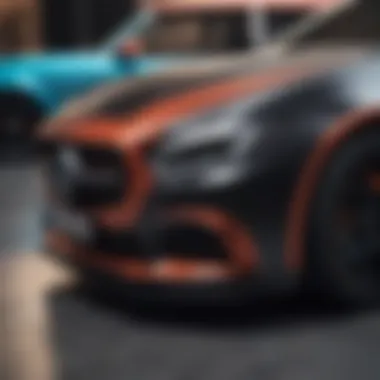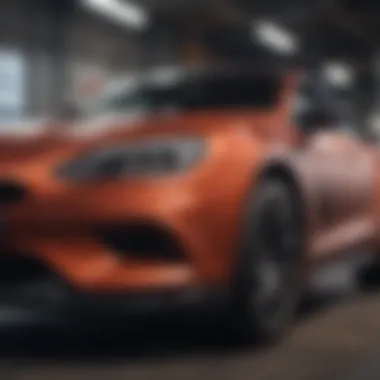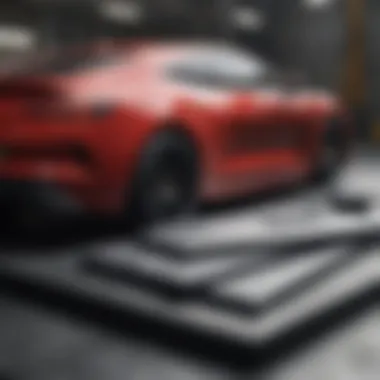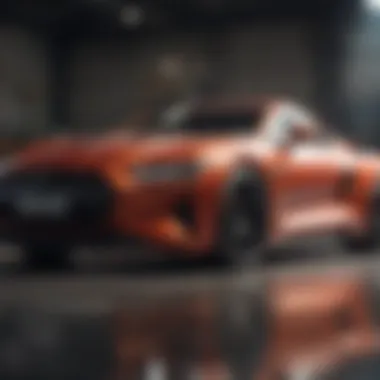Understanding the Costs of Car Wrapping: A Detailed Guide


Intro
Wrapping a car can redefine its appearance and help with identity. However, many potential car wrappers find themselves wondering about the costs involved in this significant alteration. Understanding the elements influencing the overall pricing is crucial for any automotive enthusiast or prospective buyer.
Car wrapping not only serves to enhance aesthetics but also protects original paint during resale and provides options for personalization that paint jobs simply cannot offer. This article will dissect the underlying elements contributing to car wrap costs, including materials used, labor involved, and additional sometimes-overlooked expenses.
Detailed Car Reviews
When thinking about car wrapping, one should grasp how it might influence the vehicle's design. A wrap allows for considerable customization while altering the car's perception in various circles. What many may not realize is that a thorough understanding of how aesthetics relate to the wrapping process is vital to making sound choices.
Overview of Vehicle Design and Aesthetics
In the world of automotive customizations, vehicle design stands at the forefront. Car wraps come in a myriad of colors, finishes, and patterns. These choices can dramatically affect the overall feel and appeal of the car. Individuals tend to favor wraps that compliment the original contours and unique manufacturer traits. Ultimately, this consideration can often dictate film choice or price.
Interior Features and Comfort
Though car wrapping mainly focuses on the exterior, enthusiasts should also think about the car's interior appearance. In some cases, wraps extend beyond the outer car surface. Comfortable designs mixed with stylistic wraps can significantly improve the entire driving experience. Hence, it's not just about what’s outside; comfort applies within too.
Performance Metrics and Test Drive Experience
Car wraps have minimal impact on driving performance, unlike modifying other aspects like the engine or components. It's essential for prospective wrappers to know any underlying concerns related to the added weight or changes in aerodynamics due to the aftermarket addition. Test drives often reveal subtle changes due to exterior alterations, influencing decision-making.
Fuel Economy and Efficiency
Some car enthusiasts will worry about how wrapping could affect fuel efficiency. Generally, designed wraps that are airtight can retain streamlined performance. Investigating fuel usage before and after the process may provide clarity on wrapping benefits.
Safety Ratings and Technologies
When wrapping a vehicle, think not only about colors but also about shop expertise and protection standards. Using high-quality films can not only enhance aesthetics but may also ensure adherence to safety measures. Thus, educate yourself on what materials minimize risks while providing style.
Choosing a skilled installation professional can help mitigate potential issues with safety compliance.
Ending
Exploring the cost of car wrapping requires more than just examining inflation and market trends. It necessitates understanding how quality materials, craftsmanship, and specific car shapes interlink in the overall financial evaluation of your decision. This journey unveils just how wrapping is a multi-dimensional process requiring careful thought after all.
Intro to Car Wrapping
Car wrapping has consistently gained traction in recent years, providing a form of customization that combines design appeal with practical applications. As individuals seek to personalize their vehicles, understanding the costs associated with car wrapping becomes essential. This article engages with various factors that contribute to overall expenses, thus demystifying the myth of affordability and accessibility for car wraps.
The relevance of this topic stems from the growing desire to distinguish one's vehicle from the masses. It is crucial to explore what car wrapping entails, and its benefits, particularly for individuals intent on making a statement or enhancing their vehicle’s protection.
Definition and Purpose
Car wrapping involves applying a vinyl film over a vehicle's surface. The content of this wrap can range from solid colors to intricate photographs. The primary purpose revolves around aesthetics and protection. It shields the original paint job from potential contaminants, UV rays, and physical wear. For some, the short-term yet striking appearance is an ideal balance between originality and creativity.
Understanding the definition of car wrapping helps prospective customers assess whether this customization method fits their needs and financial framework. Additionally, wrapping allows for temporary changes. This means that individuals can return to the car's original look, offering adaptability important to many.
Benefits of Wrapping a Car
The advantages of wrapping a car extend beyond sheer visual appeal. Here are some key benefits:
- Cost-Effectiveness: Compared to a traditional paint job, car wrapping can often present a more affordable option, particularly with elaborate designs.
- Ease of Implementation: The installation process is generally less time-consuming and can happen within hours, contrary to extended downtime with a paint job.
- Protection: High-quality wraps offer protective features as they guard against scratches and environmental factors, enhancing the original paint’s longevity.
- Brand Visibility: For businesses, custom wraps serve as mobile advertising, delivering brand messages wherever the vehicle travels.
- Reuse of Original Paintwork: Wraps can be removed without damaging the car's original paint, maintaining its value for future resale or trade-in.
The understanding of these advantages grants potential car wrap clients thoughtful insight on how wrapping aligns with their intentions or needs, further enforcing the significance of evaluating costs and budgeting for this distinct expression of individuality.


Cost Overview of Car Wrapping
Understanding the overall costs related to car wrapping serves as a foundational element for anyone considering this form of vehicle customization. It is not merely about the sticker price, but a combination of materials, labor, and potential hidden fees. Knowing these factors ahead of time promotes informed decisions that align with financial readiness and expectations. In this section, we will differentiate between common expenses and unexpected costs associated with a full car wrap or select detailing. The insights gained here prepare prospective clients to face any financial implications associated with their wrapping project.
Average Price Estimates
When evaluating car wrapping, price ranges generally fall anywhere between $2,000 to $5,000. Several factors intricately interweave into this pricing, making each estimate highly variable. Here is a careful breakdown of what influences this range:
- Size of the Vehicle: Bigger vehicles require more material, which increases the cost. A large SUV versus a small sedan can noticeably differ in wrapping expenses.
- Quality of Materials: The choice between standard vinyl and high-performance materials can also play a significant role. High-end products last longer but do elevate the cost frontier.
- Design Complexity: Solid colors generally cost less than elaborate graphics or custom designs. The simpler the installation, the less time labor will take.
Experts often advise seeking quotes from various service providers to clarify expected expenses more accurately. According to bulletin boards such as reddit.com, it’s common for individuals to share practical advice and reviews about their own wrapping experiences.
Factors Influencing Cost
Several determinants shape the price landscape of car wraps. Understanding these can help consumers predict spending realistically:
- Location & Market Demand: Geographic location heavily influences labor costs.^ For instance, urban areas usually see higher charges compared to rural settings, primarily due to the overall demand in metropolitan centers.
- Vinyl Quality: As stated earlier, not all vinyl wraps offer the same longevity and aesthetics. While you may save money with cheap alternatives, you risk premature wear and undelivered expectations.
- Professional Experience: The skill of the installer can also affect labor costs. More experienced professionals might charge higher rates but typically ensure superior quality and service reliability.
- Warranty and Appraisal: Some shops include warranties that influence pricing but save money long-term if the wrap deteriorates.
Being aware of these elements can influence consumer choice and provide the necessary insight to explore solid options before initiating the wrapping process.
"Not all wraps are created equal. Quality should never be compromised for the price."
By closely examining these areas, you bring clarity to your potential car wrapping investment. Preparations do not remain unique to aesthetic concerns but extend toward value maximization through informed decision-making.
Material Types and Their Costs
When considering car wrapping, understanding the different material types and their associated costs becomes essential. The material influences both the appearance and durability of a wrap. Choosing the right material not only impacts initial expenditures but may also affect long-term maintenance and overall satisfaction with the wrap.
Vinyl Wrap Options
Vinyl is the most common material used in car wrapping. It is favored due to its versatility and range of finishes, including glossy, matte, and even textured options. The cost of vinyl wrap does vary significantly based on the quality and finish.
Generally, high-end vinyl brands like 3M or Avery Dennison can range from $2,500 to $5,000 for a professional installation on a standard sedan. Meanwhile, mid-range options may fall between $1,500 and $3,000. Factors impacting cost include:
- Material quality
- Color shifts and special effects
- Thickness and evenness of the wrap
Besides appearance, the initial choices can influence longevity. High-quality vinyl can last longer against sun damage and wear compared to low-grade options. Ultimately, investing in quality vinyl can prevent premature replacement and additional expenses down the line.
Specialty Wrap Materials
Specialty wraps are unique options designed for specific applications. They include products meant to simulate custom paint jobs, textured finishes, or reflective surfaces. Such wrap types tend to be more expensive, owing to both the material costs and the intricate installation processes involved.
Some examples of specialty wraps and their typical costs include:
- Chrome wraps: These can begin at around $5,000, depending on the vehicle size and complexity.
- Reflective wraps, often used for safety, fall in a similar price range.
Using specialty materials might seem appealing for stands out, but potential buyers should specifically weigh their long-term worth. With reflective or chrome finishes, higher maintenance may usually be required, resulting in higher upkeep costs and additional factors to think about during the wrapping process.
To note: The choice of wrap must balance visual appeal and practical longevity. Understanding the nuances of material types is crucial for making well-informed financial decisions regarding car wrapping.
Labor Costs Associated With Car Wrapping
Understanding labor costs associated with car wrapping is crucial for anyone considering this customization strategy. Professionals who specialize in car wrapping charge based on skill, experience, and the complexity of the job. This section will delve into the hourly rates for wrapping specialists as well as how location affects the cost. These elements can significantly influence the overall expenditure and provide insights on choosing the right service provider.
Hourly Rates for Professionals


The price per hour for professionals in the car wrapping industry varies. Typically, they range from $60 to $150 per hour, depending on several factors. Experience is often a key driver of these rates. More seasoned professionals tend to command higher fees, reflecting their expertise. Locations where they operate also play a role. In urban settings with a greater demand for car wraps, rates may skew higher.
Some of the contributing factors to hourly rates include:
- Expertise Level: More experienced wrappers can usually command higher prices due to the skill they bring.
- Company Reputation: Established brands that have built a name in the industry often justify their higher rates based on client trust.
- Job Complexity: Customized designs require more skill and effort, thereby increasing the rate.
Factors such as reputation and project details need to be weighed when choosing a professional for a car wrapping job. Ultimately, transporting a clear snapshot of expected costs informs better decision-making across several layers.
Cost Differences by Location
The geography of car wrapping services presents notable cost disparities. In densely populated or affluent urban areas, labor costs are often higher. The reasons behind this include increased overhead and greater demand for services. It's not unusual to see hourly rates increase by 20% to 30% when comparing similar work in a major city versus a small town.
When considering the price, these points may come into play:
- Regional Cost of Living: Areas with higher living costs generally reflect those in service pricing.
- Market Competition: Regions with numerous car wrapping options may keep rates more competitive.
- Access and Specialization: Certain locations may benefit from specialized firms that focus on modern designing trends, further attuning to customer needs.
Effective comparison shopping requires much more than just a glance at prices. Evaluating the entire render and conditions surrounding a wrap service can yield greater savings and better endings in overall strategy.
To thoughtfully analyze labor costs and make informed choices, it’s essential to scrutinize these factors. Understanding the nuances in labor pricing enlightens potential customers on the true financial commitments in the car wrapping journey.
Types of Wraps and Their Cost Implications
Understanding the different types of wraps plays a key role in evaluating the cost of car wrapping. Each type presents unique characteristics, implications for budget, and aesthetic outcomes. Knowing these can help car enthusiasts and potential buyers make informed decisions when considering customization.
Full Vehicle Wrap
A full vehicle wrap covers the entire surface of the vehicle with vinyl material. This approach allows for extensive customization by altering color and finish completely. These wraps come in various materials and finishes like gloss, matte, metallic, or textured. On average, a full wrap can cost between $2,500 to $5,000. The labor involved in applying a full vehicle wrap is significant. A professional can take up to several days to complete the work.
Key considerations include:
- Color Choice: Ability to pick any color or even design.
- Durability: Full wraps typically last about 5 to 7 years with proper maintenance.
- Resale Value: A full wrap may enhance or diminish the vehicle's resale value depending on its finish and the buyer's preferences.
Partial Vehicle Wrap
A partial vehicle wrap involves applying vinyl to only a specific section of the vehicle. This might be a hood, roof, or a set of panels. The cost of these wraps is generally lower since less material and labor is required. Estimates for partial wrapping range from $500 to $2,500, depending on the wrap’s complexity and area covered.
This option is ideal for:
- Branding: Businesses often use partial wraps to advertise their name or services on fertile vehicle spaces.
- Customization: Car enthusiasts can enhance a vehicle aesthetics while preserving its primary finish.
The appeal largely lies in its cost-effective nature, allowing for unique looks without the need for a full overhaul.
Graphic and Custom Designs
Graphic and custom designs refer to wraps that are specifically made to incorporate images, logos, or unique art designed for the vehicle. These wraps often require creative input from professionals who understand how to blend aesthetics with function. The pricing for such designs can vary widely, often falling in the range of $1,000 to over $3,000, depending on the design complexity and material type utilized.
Some advantages include:
- Personal Touch: Allows car owners to manifest their brand or style creatively.
- Versatility: Works well for either partial or full wraps, enhancing various aesthetic appeal.
- Impactful Advertising: For businesses, distinctive graphics may support greater visibility and organization recognition.
Car wrapping is more than just aesthetics; it's about creative expression and functionality merged into one. Maximizing value while balancing individual needs is crucial.
Every type of wrap caters different objectives, costs, and creative avenues. Understanding these distinctions can greatly enhance one’s decision-making process when altering the vehicle’c cosmetic details.
Hidden Costs in Car Wrapping


Car wrapping can initially appear straightforward and budget-friendly, yet several hidden costs can influence your overall expenses. Understanding these hidden elements is key. They can significantly impact the final price you pay and the value you derive from this investment.
Pre-Wrapping Preparation
Pre-wrapping preparation involves several steps that may not be factored into the initial quotation you receive for a vinyl wrap. Insufficient preparation can hinder the wrap's results, making the underlying costs crucial to consider. Here are some key aspects:
- Cleaning the Vehicle: Before wrapping, the vehicle must be thoroughly cleaned to ensure proper adhesion. This often necessitates professional detailing, which adds to the cost.
- Repairs and Touch-ups: If the paintwork has chips, scratches, or dents, addressing these blemishes usually comes with an extra cost. Lesser imperfections could lead to failures in wrap application and could affect the final aesthetic.
- Surface Preparation: In some cases, you may require additional products to ensure smooth surfaces, making your initial wrap costs higher. Skipping these steps could lead to poor results after applying the vinyl, making this investment critical.
Considering these preparations levies additional costs, so clear communication with the installation shop is advised to establish a firm understanding of necessary preparations.
Post-Wrapping Maintenance
Post-wrapping maintenance plays a significant role in ensuring the longevity and appearance of the wrap. Ignoring this aspect could lead to disappointing results over time, causing increased costs due to premature removal or replacement. Below are highlighted points regarding maintenance and associated expenses:
- Regular Cleaning: Unlike standard painted surfaces, wrapped vehicles require specific cleaning products and techniques. Ensure that you use non-abrasive cleaners designed for vinyl surfaces. Any deviation might diminish the wrap's lifespan.
- Waxing Considerations: It may seem beneficial to protect a wrap with wax. However, traditional waxes can damage the wrap material. It is essential to invest in compatible waxes especially designed for vinyl wraps, therefore adding another small cost aspect.
- Repair Costs: Should any damage occur, it's crucial to get repairs done as quickly as possible to avoid prolonged exposure to the elements which could exacerbate damage. Sourcing specialized repair services can also entail extra charges than expected.
Understanding these associated costs linked with maintaining a wrap is necessary. Overall, investing in professional pre- and post-wrapping services leads to a satisfactory enhancement of your vehicle's appreance but must be integrated into the total cost framework for an accurate financial understanding.
Frequent maintenance can extend the life of your vinyl wrap, but remember, maintaining it correctly is not just advisable; it’s essential for preserving your investment.
Considerations Before Wrapping Your Car
Understanding the implications of car wrapping extends well beyond the initial financial investment. Before deciding to wrap your vehicle, several vital factors need careful consideration. These factors not only relate to the costs involved but also to how the wrap will interact with the vehicle's characteristics. Attention to these elements can make a significant difference in the outcome and satisfaction derived from the wrapping process.
Vehicle Condition and Suitability
A thorough examination of your vehicle’s condition is essential before proceeding with a car wrap. The wrap works best on clean surfaces without blemishes. Scratches, dents, and rust might prevent the wrap from fully adhering. If the underlying paint is in poor condition, the wrap can magnify these imperfections, leading to an unsatisfactory appearance.
Furthermore, certain materials require a specific surface to cling effectively. If a vehicle has OEM paint in good condition, that could enhance the longevity of the wrap. Therefore, assessing the overall suitability of the vehicle can prevent unnecessary costs related to surface preparation or reduced lifespan of the wrap. Regular maintenance data can also reflect how diligent an owner has been at caring for the vehicle.
In many cases, taking the time to prepare the vehicle properly before wrapping can lead to extended durability and superior visuals.
It's wise to consult with a professional before making decisive moves. They can provide valuable insights based on their experience. Consider scheduling pre-installation inspections to evaluate the car’s readiness.
Resale Value Impact
Car wrapping may influence the resale value of your vehicle, often in unexpected ways. While those looking for customization might admire an appealing wrap, typical car buyers may be a different audience. A wrap can detract from a vehicle’s value especially if it is poorly executed or started to deteriorate.
In cases where the wrap has been applied with high quality, it can protect the original paint underneath. This preservation can enhance resale value, as the car may appear more attractive to certain buyers, known for seeking unique aesthetics. Brands and styles commonly associated with care and initiative can add value when marketed correctly.
It's also important to consider that removing the wrap might leave the underlying paint vulnerable to dings or fading. Professionals prioritize high-quality materials which allow for easier removal, keeping the underlying surface intact. Maintenance needs to be prioritized for those utilizing vehicle wraps for a long time, as regular care could affect perceived resale value. Thus, the overall impact of a wrap on vehicle resale is a dual-edged sword that necessitates careful balancing.
Culmination
Car wrapping is a decision that goes beyond aesthetics. It demands careful financial consideration. The importance of analyzing various costs involved in car wrapping is crucial for making informed choices. Budgeting for such an investment includes numerous factors like material selection, labor expenses, and maintenance costs.
Summary of Cost Insights
To summarize, understanding the overall costs of car wrapping can help car owners feel more comfortable. Key insights into the pricing structure encompass:
- Material Costs: Different types of vinyl and specialty wraps come with unique price points.
- Labor Fees: Rates can vary based on geographical location and professional expertise.
- Hidden Expenses: Additional costs for pre-wrapping preparation and post-wrapping care should not be overlooked.
- Investment Value: Quality wraps can enhance a vehicle's appearance while genuinely affecting resale values.
Providing readers with a comprehensive overview highlights how their customization choices can impact their budgets significantly.
Final Thoughts on Car Wrapping investment
Reflect on:
- The durability of materials can lead to a longer lifespan of the wrap.
- Choosing reputable professionals to ensure a satisfying outcome also adds to total expenses.
- Value retention of the vehicle might benefit from a high-quality wrap that still appeals to future buyers.
Being educated about the wrap process helps vehicle owners appreciate both the benefits and potential pressures. Making modality-aware choices assures a worthy endeavor in the realm of car customization.







